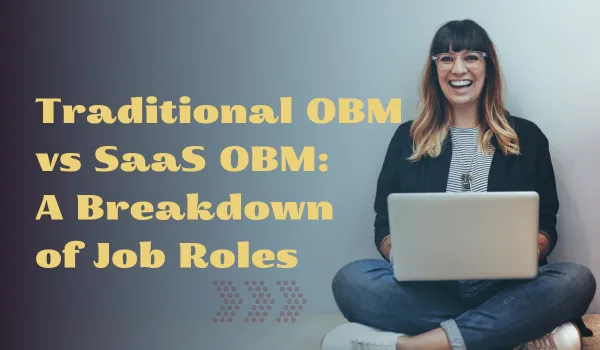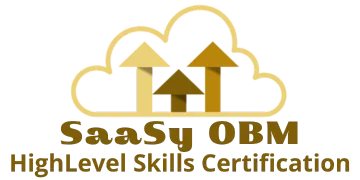Blog
Turn Your Tech Obsession into Recurring Revenue and Build a Biz That Loves You Right Back!
Your Investment
Your investment includes the certification program plus the HighLevel Agency plan.
The expectation is that during the program, you transition your own business SaaS software to HighLevel and in the process recoup the cost of your HighLevel investment.
Total 3 Month Investment
$2899
only $899!
pilot program savings $2000

Traditional OBM vs SaaS OBM: A Breakdown of Job Roles
In the ever-evolving world of business operations, the role of an Online Business Manager (OBM) has become increasingly vital. However, with the rise of Software as a Service (SaaS) solutions, a new specialization has emerged: the SaaS OBM. While both roles share some commonalities, there are distinct differences that make the SaaS OBM uniquely suited to businesses heavily reliant on technology. Let's explore the comparison between an OBM and a SaaS OBM and why the latter is essential for modern businesses.
Traditional OBM vs. SaaS OBM: A Snapshot
Traditional OBM:
General Management: Oversees a variety of business operations, from project management to team coordination.
Strategic Planning: Develops strategies to improve business processes and efficiency.
Operational Support: Provides support in areas like marketing, finance, and HR.
Resource Allocation: Manages budgets and resources to ensure projects are completed on time and within budget.
SaaS OBM:
Technology Strategy and Planning: Crafts comprehensive technology plans aligned with business goals and stays updated on emerging tech trends.
SaaS Software Administration: Acts as the Super Administrator for all SaaS platforms, managing configurations, user access, and integration within the IT ecosystem.
Technology Implementation: Leads the deployment of new SaaS solutions, coordinates with teams, and manages vendor relationships.
System Maintenance and Support: Troubleshoots technical issues, optimizes system performance, and provides ongoing user support.
Training and Documentation: Develops training programs and user guides, ensuring staff can effectively use SaaS tools.
Diving Deeper into the SaaS OBM Role
A SaaS OBM is essential for any business relying on SaaS solutions to drive its operations. This role combines strategic planning, technical expertise, and project management to ensure technology solutions are effectively implemented, maintained, and optimized to support business success.
Technology Strategy and Planning
Developing Technology Strategy: A SaaS OBM crafts a comprehensive technology plan that aligns with the company's business goals. They stay abreast of emerging technologies and industry trends to ensure the business remains competitive.
Budgeting and Resource Allocation: They plan and manage the technology budget, allocating resources effectively to maximize the return on technology investments.
SaaS Software Administration
Super Administration: Acting as the Super Administrator for all SaaS platforms, the SaaS OBM manages high-level configurations and settings, ensuring proper setup and integration of SaaS applications within the business's IT ecosystem.
User and Access Management: They create and manage user accounts, roles, and permissions, ensuring compliance with security protocols and access policies.
Technology Implementation
Project Management: SaaS OBMs lead the implementation of new SaaS solutions from initiation to completion, coordinating with cross-functional teams to ensure smooth deployment and integration.
Vendor Management: They select and manage relationships with SaaS vendors, negotiating contracts and service level agreements (SLAs) to ensure the best value and service.
System Maintenance and Support
Troubleshooting and Issue Resolution: SaaS OBMs diagnose and resolve technical issues with SaaS applications, providing support to users experiencing problems with software tools and automations.
System Optimization: They monitor system performance and make necessary adjustments to improve efficiency, implementing updates, patches, and enhancements to keep systems current and secure.
Training and Documentation
User Training: Developing and delivering training programs, SaaS OBMs ensure staff can effectively use SaaS tools. They create user guides and documentation for reference.
Support and Communication: They provide ongoing support to users, addressing any questions or concerns, and facilitate communication between technical teams and non-technical stakeholders.
Key Skills and Competencies of a SaaS OBM
Technical Proficiency: Deep understanding of SaaS platforms, cloud computing, and related technologies. Strong problem-solving skills to troubleshoot and resolve technical issues.
Project Management: Excellent project management skills to lead technology implementations and manage multiple projects and priorities simultaneously.
Strategic Thinking: Ability to develop and implement technology strategies that align with business objectives. Analytical skills to assess technology needs and identify optimal solutions.
Communication and Collaboration: Strong communication skills to work effectively with various stakeholders. Ability to translate technical concepts into non-technical terms for business leaders and users.
While both traditional OBMs and SaaS OBMs play crucial roles in business operations, a SaaS OBM brings specialized expertise that is increasingly necessary in today's tech-driven world. By focusing on technology strategy, SaaS administration, and system optimization, SaaS OBMs ensure businesses can leverage their SaaS solutions to achieve maximum efficiency and growth. All businesses rely heavily on SaaS tools, making the investment in a SaaS OBM more and more a requirement of businesses to unlock the full potential of their technology.
Saasy OBM® may receive affiliate compensation for some of the links on this site at no additional cost to you. You may read my Affiliate Disclosure.
This website is not intending to provide financial or legal advice.


